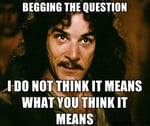 Talking about misused words and phrases can be tricky, especially given that the definitions in many commonly used dictionaries (e.g., Merriam-Webster) morph to reflect popular usage — even to the point where a word contains two definitions that mean the exact opposite, as in these examples:
Talking about misused words and phrases can be tricky, especially given that the definitions in many commonly used dictionaries (e.g., Merriam-Webster) morph to reflect popular usage — even to the point where a word contains two definitions that mean the exact opposite, as in these examples:
Literally: (1) actually, (2) virtually; in effect
Peruse: (1) to look at or read in an informal or relaxed way, (2) to examine or read in a very careful way
While such changes can at times be maddening and sometimes downright confusing, the fact is, words and meanings evolve (or devolve, depending on your perspective).
In our ongoing efforts to elevate the English language (or at least to slow its decline), we look this week at five commonly misused words or phrases and how to use them correctly.
1. BEG THE QUESTION
What many think it means: raises the question
Incorrect usage: It’s casual Friday, which begs [read: raises] the question of why you’re wearing a suit.
What it really means: to assume as true the very conclusion one is attempting to prove (i.e., circular reasoning)
Correct usage: To assert that you’re right because everyone agrees with you begs the question of whether everyone has agreed with you erroneously.
2. COMPELLED
What many think it means: wanting to do something
Incorrect usage: Andy was compelled [read: wanted] to take off Monday to extend the three-day weekend to four days.
What it really means: forced or driven to do something
Correct usage: Because Andy had no more vacation time, he was compelled to return to work on Monday.
3. INGENUOUS
What many think it means: not genuine OR ingenious (clever, skillful, inventive)
Incorrect usage: Tom grew tired of Laurie’s ingenuous [read: not genuine] compliments because he knew she was telling their supervisor a different story.
What it really means: innocent, candid, lacking craft or subtlety
Correct usage: For all his worldliness and business acumen, Marcus was rather ingenuous in matters of the heart.
4. NONPLUSSED
What many think it means: unfazed, unimpressed, nonchalant
Incorrect usage: The witness, nonplussed [read: unfazed] by the prosecutor’s aggressiveness, responded calmly to each question.
What it really means: a state of bafflement or perplexity
Correct usage: Beth was nonplussed by all the media coverage surrounding her return of the found money to its rightful owner — she was just doing the right thing.
5. TRAVESTY
What many think it means: a tragedy
Incorrect usage: That Barbara succumbed to the cancer seemingly overnight is a travesty [read: tragedy].
What it really means: a parody or grossly inferior imitation
Correct usage: Many consider the outcome of the O.J. Simpson trial a travesty of justice.
What other misused words or phrases do you regularly encounter? Let us know in the comments below.




